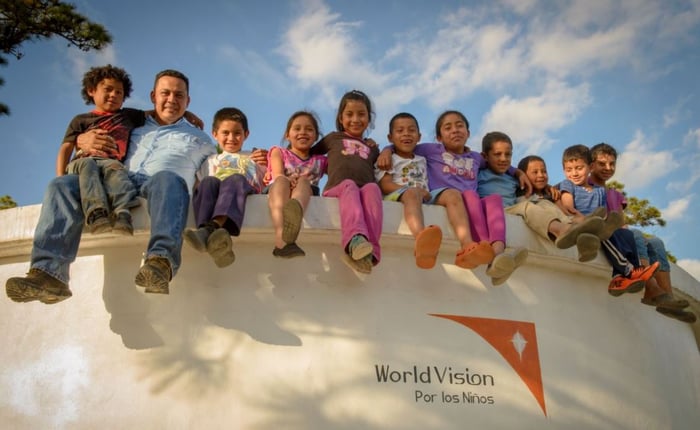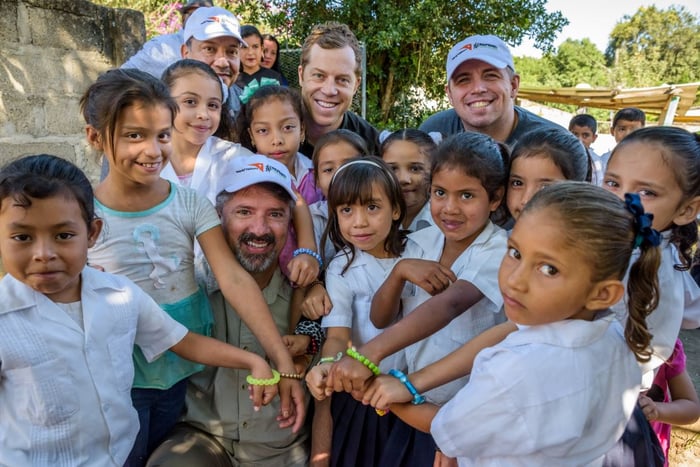Addressing the Root Causes of Immigration in Honduras
The immigration issue is very much in the spotlight globally. No matter what your opinions are on this issue, there is consensus that the vast majority of people migrating to the U.S. from Central America would prefer to stay in their home countries if they had opportunity and safety. In addition, there’s agreement that extreme poverty is one of the top causes of people leaving their homes to seek a better opportunity. For World Vision, our mission is eliminating extreme poverty and this newsletter focuses on how we are doing that successfully in Honduras.
 |
|
To help solve poverty, you have to first make sure people have clean water as it’s the basis for sustained development. An estimated 638,000 Hondurans lack a clean water source. Many Honduran's drink from water sources that are just as contaminated as those in sub-Saharan Africa. This may seem surprising for a country that’s only a short flight from the U.S., but the impact on children’s health is all too real and significant. In response, last year World Vision reached more than 40,000 Hondurans with a clean water source and we’re committed to reaching 200,000 Hondurans, nearly one-third of the population needing clean water, within 5-years.
Our work to provide clean water in Honduras often means protecting springs that are high in the mountains and then running a pipeline into storage tanks near communities where the water can be disinfected and then piped to individual homes. The local communities contribute the hard work to dig the trenches that will hold the water pipelines, many times digging trenches for miles through the mountains. Frankly, I’ve never seen anyone work harder than Hondurans to get clean water. Here’s a new video so you can see this work.
| |
 |
One of our most important partners of our work in the effort in Honduras is Refined Technologies Inc (RTI) who is investing $1 million a year to be part of this effort to reach 200,000 people with clean water. One of the reasons that RTI and other donors are making this investment is because they’ve seen first-hand that World Vision integrates our water work with our efforts to literally lift families out of poverty by helping them increase their income above the poverty line. We work with farmers so they improve their farming practices, create Co-ops of producers to get better and more profitable access to markets, and provide financial loans so they can expand their businesses.
In Honduras, many of the farmers are coffee farmers and we’ve captured the amazing story of two coffee farmers, Genri and Marisol, who have worked with World Vision. Cody Nath, the President and CEO of RTI, has coined the phrase “Water to Coffee to Mug” to capture this story. He is so excited about the effort that he’s invested in a coffee company, Café 504, to bring Genri and Marisol's coffee to the U.S. and help spread the news of how providing clean water can transform lives. Please watch this video.
|
World Vision Response to Cyclone Idai
In mid-March, a massive storm hit southern Africa causing widespread devastation in Mozambique, Malawi, and Zimbabwe. Three million people, one-half of them children, have been displaced. The biggest immediate needs are clean water, sanitation, and hygiene, as well as shelter and health care. World Vision was uniquely ready to respond to this disaster because of our large number of local staff with water, sanitation, and hygiene expertise. We quickly augmented our local team with members of our Global Response Team. In addition, because of our global preparedness for disaster response, we were able to respond from our warehouse in Dubai with emergency supplies and we teamed up with the US government to use their C130 aircraft to airlift supplies.
One of the biggest concerns now is cholera. Because of unsafe water, cholera has appeared in several areas with over 6,500 confirmed cases to date. Cholera can kill quickly but the cholera germ is quickly killed by simple disinfectant and World Vision is providing 50,000 cholera kits that include a disinfectant for drinking water and soap to prevent the spread of disease. World Vision has the opportunity to seek a grant of $1 million from UNICEF to further our work if we are able to generate $100,000 in private donations. Please help us respond here.
|